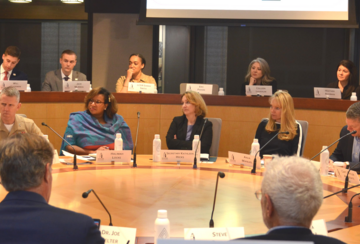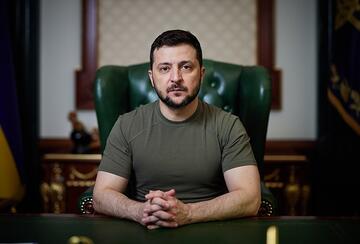
Siegfried Hecker: Putin has destroyed the world nuclear order. How should the democracies respond?
One of the world’s foremost nuclear security and policy experts, Sig Hecker has spent much of an illustrious career working to enhance cooperation among US and Russian scientists and their governments in hopes of reducing nuclear risk.

While Ukrainians fight or flee Russia’s bombardment of their cities, many Europeans feel a palpable, renewed nuclear fear.

A visit from the Department of Defense’s deputy secretary gave the Gordian Knot Center a prime opportunity to showcase how its faculty and students are working to build an innovative workforce that can help solve the nation’s most pressing national security challenges.

Russia's ongoing war in Ukraine demonstrates that hypothetical scenarios of cyberattacks paralyzing satellite communications are already taking place.

What is Ukraine’s best security guarantee?
What is Ukraine’s best security guarantee?
Russia’s unprovoked and unjustified war on Ukraine has run nearly seven weeks.

What is genocide? Did the Soviet Holodomor (man-made famine) in 1930s Ukraine fit this definition? Do the recent atrocities in Bucha? Has the Russian military conducted itself in a similar manner in prior conflicts? Is there a pattern there? Find out as Sean Patrick Hazlett meets with Stanford Professor Dr. Norman Naimark.
Amy Zegart on the Capabilities of American Intel Gathering

Nearly 70% of Americans surveyed by the American Psychological Association said they worry the invasion of Ukraine could potentially lead to nuclear war and they fear that we could be at the beginning stages of World War III.

All wars come to an end. One side may be conquered, the attacker may give up and withdraw, or the warring parties can negotiate a settlement.

On March 15, as the Russia-Ukraine war neared the three-week mark, Brookings experts held a discussion on developments in the conflict so far and what might be coming.

Not much happened after India’s accidental cruise missile launch into Pakistan—this time.
India accidentally fired a cruise missile into Pakistan on March 9, 2022. The missile was not armed and no lives were lost. Both sides projected calm in the incident’s aftermath. Still, the incident raises questions about the safety of India’s cruise missile systems, especially given the real risk of accidental escalation between nuclear-armed adversaries.

A week before Russian President Vladimir Putin invaded Ukraine on Feb. 24, unleashing the biggest military operation in Europe since World War II, three experts on Russia were interviewed on Zoom and email by Carol Giacomo, chief editor of Arms Control Today, about the origins of the crisis and what an eventual solution might involve.

A few possible reasons: the United States has been helping Ukraine strengthen its cyber infrastructure, U.S. cyber offensive forces may have been disrupting Russian attacks against Ukraine, and the Russians may not be capable of conducting such a large-scale attack.
The World’s Most Dangerous Man
Putin’s Unconstrained Power Over Russia’s Nuclear Arsenal. Putin has turned his government into a personalist regime: a system in which he monopolizes meaningful authority.
In 2010, the world was introduced to Stuxnet, a sophisticated malware developed by Israel and the United States that successfully targeted and damaged the Iranian uranium enrichment plant in Natanz. Named “the world's first digital weapon,” Stuxnet changed the way the global security communities perceived the range of cyber threats.
The truth about nuclear deterrence
Putin might well believe that a world without Russia in its rightful position of power is not worth existing. We can’t be sure of what Putin is thinking, or whether his decision making is compromised – all we can do is prepare for the possibility of Russia’s use of nuclear weapons.

A new video curriculum series is released.
Tacit rules to avoid a NATO-Russia war
While the United States and NATO have sided squarely with Ukraine, the victim of an unprovoked invasion by Russia, US and NATO officials have also made clear their desire to avoid a direct military clash with Russia.
Q & A with Dr. Dean Winslow and Ben Lambeth

The Cuban Missile Crisis dealt not only the United States and the Soviet Union, but other countries around the world, what I call a short, sharp shock. We recognized how devastating would be the effect of nuclear war, and we decided we really did need to talk together about how we were going to control and limit those risks.
Russia vs. Ukraine: How does this end?
On February 24, Vladimir Putin launched the Russian military on what he termed a “special military operation,” his euphemism for a massive invasion of Ukraine.
How to Stop a New Nuclear Arms Race
With Russia Going Rogue, America Must Cooperate With China

Contemporary humanitarians: Latin America and the ordering of responses to humanitarian crises
The paper looks at how Brazil, Chile, and Mexico approached debates on humanitarian intervention norms in the early 2000s. These countries attempted to simultaneously address humanitarian crises collectively and prevent abuses of humanitarian norms by great powers.









